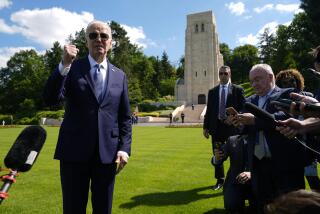Foreign Policy Profile
- Share via
A President whose tenure is likely to always be shadowed by his own avoidance of military service could have felt some awkwardness as he led ceremonies honoring those Americans who fought and died a half-century ago to help achieve Europe’s liberation. But Bill Clinton met the occasion with a dignity that did credit to the moment and to his office. Everywhere, he spoke with feeling, grace and sometimes memorable eloquence. Like the veterans of the war against Nazism who returned to the battlefields of their youth, most Americans who followed the D-Day ceremonies surely were moved.
Clinton, in short, met the high expectations the American people have for their President on such occasions. But in a context where every word and step can be scripted and rehearsed--and saying this in no way detracts from what he accomplished--that is really the easy part of the job. The far greater task is to bring the same degree of sureness and competency to the day-to-day management of his office.
For any modern President, whether he likes it or not, foreign policy is half the job. It’s no secret that after 17 months in office Clinton’s approach to foreign policy still seems to lack context and direction; it lacks, in other words, clear leadership. Clinton’s visit to one of World War II’s climactic battlefields inevitably evokes memories of one of his great predecessors, Franklin D. Roosevelt, who also faced a formidable domestic agenda but who was compelled also to think and act globally. The global challenges haven’t gone away. They still insistently demand and must have the President’s urgent attention.
More to Read
Get the L.A. Times Politics newsletter
Deeply reported insights into legislation, politics and policy from Sacramento, Washington and beyond. In your inbox twice per week.
You may occasionally receive promotional content from the Los Angeles Times.








